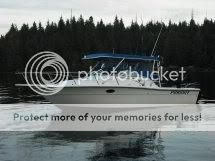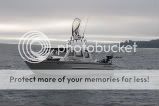I am not so sure; I would be ignoring that invoice? Might want to read the answer to question number 15 before making that decision?
Q. 1. Why am I being asked to pay the Marine Navigation Services Fee?
The MNSF is based on the premise that those who benefit directly from publicly funded services should contribute to the cost of those services. The MNSF recovers a portion of the total costs incurred by the CCG in providing marine navigation services to commercial ships.
Q. 2. What aids to navigation and VTS services am I being asked to pay for?
Aids to navigation for which you are being asked to pay a portion of the cost include visual aids such as lightstations, buoys, channel markers and day beacons; radar aids including reflectors, beacons and RACONs; aural aids including fog horns, bell and whistle buoys and Loran-C. Vessel Traffic Services (VTS) include the monitoring of vessel movements via VHF radio communications and shore-based radar surveillance equipment, the issuing of the Notice to Mariners and Notices to Shipping, the establishment of compulsory traffic routes and the provision of weather forecasts.
Q. 9. What if I don’t need or use the Coast Guard’s navaids? Do I still pay the MNSF?
Yes, if there are commercial aids in the geographic area in which your vessel(s) operate(s), you will have to pay.
Q. 13. Will the Coast Guard send me an invoice for the MNSF fee for my domestic vessel(s)?
Yes, for domestic vessels operating in Eastern Canada, DFO’s Marine Services Fees Billing, Collection and Compliance (MSFBCC) office will mail out the package including a covering letter, an invoice, a worksheet and an adjustment form.
In the Western Region, CCG contracts with Thunder Bay Airport Services Inc. to invoice owners/operators of domestic vessels on CCG’s behalf.
Q. 14. How often will I receive an invoice for the Marine Navigation Services Fee?
In Eastern Canada, the owner, operator, or charterer of a domestic vessel will be invoiced at the end of each billing quarter, based on the government fiscal year, namely:
• Quarter 1: April, May and June
• Quarter 2: July, August and September
• Quarter 3: October, November and December
• Quarter 4: January, February and March
In the Western Region, domestic vessels are billed on an annual basis once at the beginning of the fiscal year (i.e., in April).
Q. 15. How long do I have to pay the invoice?
MNSF invoices in Eastern Canada and the Western Region are to be paid within 30 days of the invoice date. Interest will be charged on overdue accounts commencing on the 31st day after the invoice date compounded monthly, at the average Bank of Canada rate for the preceding month plus 3%.
Q. 16. What MNSF fee will I have to pay?
For most domestic vessels in Eastern Canada, the current rate is $1.14 per Gross Tonnage (GT) of the vessel to a maximum of 50,000 GT, plus applicable GST/HST/PST unless the vessel is a ferry, bulker, self-unloader or containership.
In the Western Region, all domestic vessels pay the following:
• =>1,000 GT Annual fee of $5,900 + $0.45 per GT
• 15 GT to 1,000 GT Annual fee of $300 + $9.50 per GT
• Tugs of 5 GT but < 1,000 GT Annual fee of $300 + $9.50 per GT
• <5 GT other than above Annual fee of $200 per vessel
• Fleet Rental Boat Annual fee of $25
Q. 23. In Eastern Canada, what happens if I don’t operate my vessel in one or more billing quarters? or for the entire year in the Western Region?
You may be eligible for a credit if your vessel was inactive for an entire billing quarter. Included with your Invoice and Worksheet is a "Marine Navigational Services Fee Domestic Fleet Adjustment Form". This form is to be completed every quarter if there has been a change in your vessels’ billing status. You qualify for an MNSF credit for that quarter, provided the form is received within 10 days of the end of the quarter for which you are claiming the credit. If the required information is received before the MNSF invoice has been issued, the MSFBCC office will cancel the invoice for that billing quarter. After the invoice has been issued, the owner/operator will receive a credit note shortly after receipt of the notification of inactivity by the MSFBCC office.
For a domestic vessel to be exempted from payment of the fee in the Western Region, the vessel must be inactive for the entire billing year.
Q. 30. I have registered my yacht in the Canadian Ship Registry and use it exclusively for recreational (non-remunerative) purposes. Am I subject to payment of the MNSF?
A registered yacht that is used exclusively by the owner/operator/charterer for non-remunerative purposes is not subject to payment of the MNSF.
Q. 33. Why am I being invoiced the MNSF while other vessels performing the same service are not?
The CCG is committed to applying the MNSF fairly and equitably to all vessels required to pay. However, in a marine environment with so many vessels engaged in such a wide variety of commercial marine activities, the CCG may not be fully aware of all of the vessels that should be paying the fee. The CCG is continually improving its ability to identify those vessels that should be paying the fee with the help of clients.
Q. 35. What if I want more information on the MNSF or have a problem with my Statement of Account? Invoice? Worksheet?
In Eastern Canada, if you wish more information on the MNSF or if your worksheet is incomplete or incorrect, please contact the MSFBCC office at our toll-free number 1-800-563-6295. If you need help in deciphering your invoice or Statement of Account, please contact DFO Revenue Accounting at (800) 563-6295.
In the Western Region, queries on invoices or Statements of Account should be directed to Thunder Bay Airport Services Inc. at (807) 473-2611.
This pamphlet is the first in a series prepared by the CCG.
http://www.ccg-gcc.gc.ca/eng/CCG/Ice_Fees_To_Canadian_Vessels [
[ ] [xx(]
] [xx(] 

